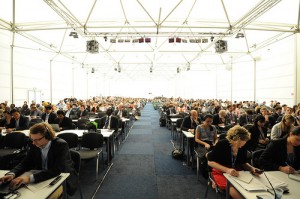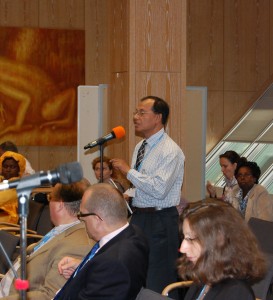Lisa Elges, Climate Governance Programme Manager at Transparency International, reports from the Bonn climate talks on strengthening civil society participation in climate governance.
In March 2011 an investigative journalist in Bangladesh discovered that US $34,000 earmarked for re-forestation projects had been handed to an organisation that trains people to repair computers. This was one of 53 such awards, 10 of which went to organisations that were either owned by or linked to local political leaders from Bangladesh’s ruling party. Transparency International Bangladesh petitioned parliament, resulting in an official review of the award process.
We co-hosted a workshop at this at the Bonn climate talks with Germanwatch, ActionAid and the IIED, where Iftekhar Zaman of TI Bangladesh hammered home the point that civil society has a pivotal role to play in exposing governance risks in climate finance, through participating in and monitoring budgets, for example.
As we say in our Global Corruption Report, civil society needs to be able to play this role both where the policies are made as well as where they’re carried out. The trick is to make this happen.
There is broad-based frustration at the slow pace of progress. An agenda for the two-week negotiations leading up to the December 2011 climate change summit in Durban, South Africa, was only agreed on 10 June: four days after they had started.
 The day before our joint workshop, the key roles and necessity of civil society participation in climate governance were discussed in the Subsidiary Body for Implementation workshop on enhancing the engagement of observer organizations. There was consensus on the fact that civil society was an important actor but this needs to be translated into action by enabling and strengthening this participation.
The day before our joint workshop, the key roles and necessity of civil society participation in climate governance were discussed in the Subsidiary Body for Implementation workshop on enhancing the engagement of observer organizations. There was consensus on the fact that civil society was an important actor but this needs to be translated into action by enabling and strengthening this participation.
Sven Harmeling from GermanWatch discussed the Adaptation Fund, and an NGO Network set up to promote civil society participation at country level. Adaptation Fund board meetings are generally open to civil society observers, he said. The Fund webcasts all its meetings and publishes most meeting documentation (especially project proposals) well in advance of any discussions, offering members of the public a chance to submit their comments.
All this enhances transparency and accountability in decision-making processes and is conducive to civil society participation. However, there is great room for improvement – in the way civil society’s comments are actually acted on, for example.
Ilana Solomon, from ActionAid USA, spoke about the Climate Investment Funds (CIF), and the Pilot Programme on Climate Resilience (PPCR) in particular. The CIFs invite civil society observers to inform their decision-making. But Solomon questioned the ability of these observers to represent their broad-based constituencies, spanning remote indigenous communities to the private sector. The limited number of observers that are able to participate in CIF sub-committee meetings also signals a less open, more restrictive approach.
One audience member further criticised the way observers are selected. While the CIFS have been innovative in using an independent organisation to oversee observer selection processes, numerous concerns were raised regarding the voting procedures and observers’ overall competence. (More approaches to involving NGOs are discussed here).
Transparency International is spearheading a comprehensive consultation process to improve this selection process. Our findings will inform the CIF Partnership Forum on the 24th-25th of June- a two-day public event that offers stakeholders a chance to discuss the CIFs’ first few years, its achievements and challenges, and how best to apply lessons learned from the 45 developing countries that the CIF supports.
Getting this right is important. Moderator Ian Tellam of AdaptationWatch underscored the need to increase the capacity and space for civil society participation in climate governance. Increased participation promotes good governance and introduces important safeguards against corruption risks.
As Iftekhar Zaman points out, without NGO participation at the global forums, there will be little chance for local civil society engagement.
Photo credit: Flickr/UN Climate Talks

















 Connect with us on Facebook
Connect with us on Facebook Follow us on Twitter
Follow us on Twitter